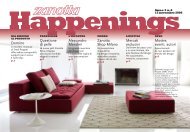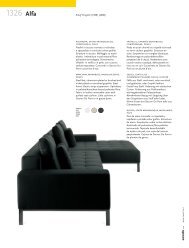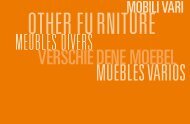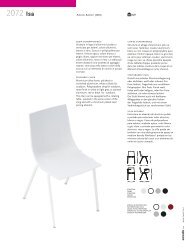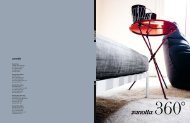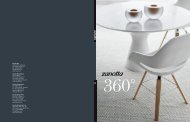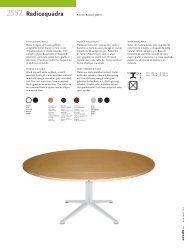Happenings - Zanotta SpA
Happenings - Zanotta SpA
Happenings - Zanotta SpA
Create successful ePaper yourself
Turn your PDF publications into a flip-book with our unique Google optimized e-Paper software.
LIFESTYLE<br />
<strong>Happenings</strong><br />
no.3/06 p.5<br />
The decision to build new settlements - often<br />
around a considerably old nucleus (the village<br />
we wish to discuss dates back to 1500) - in<br />
landscapes that are not unlike the Italian hill<br />
and lake country is rather frequent. The solution for such<br />
settlements could be terraced houses enhanced by a<br />
radical novelty: sustainable energy. We are in the town<br />
Affoltern am Albis, Switzerland, between Zug and Zurich<br />
on A road 9. It counts 10,000 inhabitants and the mayor is<br />
a woman. On land located a few hundred meters from the<br />
cantonal road, uneven land at the foot of the hills, which<br />
separate Affoltern from lake Zurich, stands a complex of<br />
terraced houses, which even at a distance make us<br />
perceive that something different has been conceived. The<br />
houses are not too far apart - which reveals focus on good<br />
neighbourly relations -, volumes are simple, the use of<br />
unprocessed wood is evident, balconies are spacious and<br />
there are solar panels. Ten terraced complexes numbering<br />
four homes each have a 10,000 sq.mt. total living surface<br />
area. Though the urban layout is thick, interiors are<br />
spacious: all homes are designed on 6 metre modules<br />
with the same layout but variable surface area and number<br />
of floors. All have three floors: some with a basement and<br />
others with three floors above ground level. But the most<br />
relevant features do not catch the eye instantly. Each<br />
house is modulated on both an active and passive use of<br />
solar energy: main entrances and bathrooms are located<br />
in such a way as to liven up internal spaces to create<br />
varying tracks for sunlight. The kitchen and entrance are<br />
separated by a glass wall designed to increase the effect of<br />
transparency, full-length glass windows in bathrooms<br />
overlook the landscape and balconies on every floor<br />
expand space and shield the sitting-room and bedrooms<br />
from direct sunlight. Every home is arranged for the<br />
installation of solar panels to heat hot water. Heating<br />
instead is based on a heat pump, which makes use of the<br />
thermal contribution of underground waters by means of<br />
10 cm pipes that extend for a length of 180 metres. This<br />
heating method removes the use of all types of fuel.<br />
Global consumption complies with the best indexes<br />
established by the recent European law concerning<br />
buildings’ energy certification: 51 kWh/sq.mt./year. It is<br />
one of the best high end products. Houses in Looren<br />
stand on concrete foundations, but the rest of the<br />
structure is in wood. The colour of deal is touching and<br />
warm - local red spruce and Douglas spruce! They are left<br />
natural with neither finishes nor preservative treatment.<br />
The flat roof is covered by a ca. 10 cm vegetable layer: in<br />
case of strong rain the layer holds part of the rain water,<br />
slowly releasing it into a stream which runs through the<br />
settlement. There is greenery everywhere with birds and<br />
small woodland mammals. The municipal swimming-pool<br />
is not very distant and it is free of charge; the football<br />
team is not listed in the stock exchange and winter snow<br />
invites to do cross-country skiing. In good weather one<br />
goes running with an ipod in the pocket.<br />
Assembled wooden frame for the ecologic building designed by Metron.<br />
The<br />
zero-energy<br />
future<br />
The housing complex based on<br />
terraced houses in Looren, Affoltern<br />
am Albis, Switzerland, is an<br />
exemplary case of sustainable low<br />
consumption architecture. Project<br />
Metron’s research has focused on<br />
optimising energy, ecological<br />
features and high living standards



